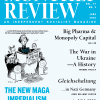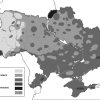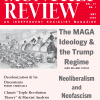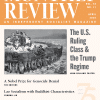
June 2025 (Volume 77, Number 2)
This month, the editors dive into the history of Nazi Germany for a discussion of Gleichschaltung, which in this instance describes the “falling into line” of institutions and individuals under fascism. As the editors point out, the extralegal and norm-breaking actions may be justified rhetorically by the fascist regime but require the acquiescence of the larger society in order to become effective—a process we are currently watching in real time. | more…

The Trump Doctrine and the New MAGA Imperialism
In this third installment of MR‘s series on the MAGA movement, John Bellamy Foster explores the dramatic shift in U.S. imperialism that began with the first Trump presidency and has accelerated in his second. The shift, Foster explains, is not one driven by anti-imperialism and anti-militarism but rather represents a hard shift to the right fueled by hypernationalism and the goal of recapturing U.S. power on the world stage. | more…

The War in Ukraine—A History: How the U.S. Exploited Fractures in the Post-Soviet Order
Thomas Palley identifies and illuminates both the internal and external drivers of the war in Ukraine. Through this article, he explores how the breakup of the Soviet Union, the aggressive expansion of NATO, U.S. neoconservative geopolitics, present-day Ukraine’s domestic tensions, and other factors led to the current conflict, in which the only winner seems to be the United States. | more…

Big Pharma and Monopoly Capital: Four Dynamics in the Decline of Innovation
In an age of cutting-edge medical science, how do the world’s largest pharmaceutical companies stifle innovation in order to juice profits and remain competitive in the international markets? The answer, Jia Liu writes, can be found in the concept of monopoly capitalism. This brand of “intellectual monopoly capitalism,” she notes, contributes to “a logic of expropriation and rent-seeking,” leading in turn to “closed science and declining medical innovation.” | more…
What’s going on
A new poem by Marge Piercy. | more…

‘Gleichschaltung’ in Nazi Germany
In this excerpt from John Bellamy Foster’s Trump in the White House (Monthly Review Press, 2017), Foster expands on the concept, origins, and practical effects of Gleichschaltung (falling into line) in Nazi Germany and its relevance today. As Foster writes “to put such a neo-fascist strategy in place requires a new kind of Gleichschaltung“; one in which all of society—from the judiciary to Congress to cultural and media institutions—are brought into line. | more…

May 2025 (Volume 77, Number 1)
In the Notes from the Editors, MR editors dissect the true meaning behind the right-wing obsession with “Cultural Marxism” and its use to justify the right-wing takeover of the administrative state and the spread of the New McCarthyism threatening all those who oppose the administration. However, the editors point out, what the right fears is not a culturally based, postmodern approach to Marxism, but Marxism as it is historically and materially grounded and its true potential for building a proletarian movement against fascism. | more…

The MAGA Ideology and the Trump Regime
John Bellamy Foster presents a rogue’s gallery of the fascist ideologues insidiously pushing the MAGA agenda, from the Heritage Foundation and its Project 2025 to neo-Nazi YouTubers and cultural influencers. “The political and ideological successes of the MAGA movement,” Foster writes, “were made possible in part by a liberal-left that abandoned the working class economically and politically.” | more…

Neoliberalism and Neofascism
As we mourn the loss of prolific MR author and media advocate Robert W. McChesney, we are grateful to be able to publish an excerpt from his introduction to John Bellamy Foster’s Trump in the White House (Monthly Review Press, 2017). In this insightful analysis, McChesney explains how neoliberal restructuring prepared paved the way for Trump and the neofascist MAGA movement to reach the dizzying heights of power that they have reached today. | more…

Decolonization and Its Discontents
Pranay Somayajula dives deep into how the idea of decolonization has taken hold both theoretically and practically, showing how its deployment by the fascist Hindutva movement to justify anti-Muslim oppression reveals a latent threat: potential cooptation by actors seeking to promote nationalist identities in postcolonial contexts. Somayajula concludes that what is needed is a “return to a materially grounded understanding of empire and resistance,” adding that “Any version of decolonization…placing a greater importance than the abstract than the material is a ‘decolonization’ that has lost its way.” | more…

China’s “Triple Revolution Theory” and Marxist Analysis
In this contribution to the further development of socialism with Chinese characteristics Cheng Enfu and Yang Jun offer their “Theory of Triple Revolution,” enumerating the historical stages of the Chinese Revolution and analyzing its current trajectory. A complete revolutionary view of Marxism in China, they conclude, “will advance the spirit of the revolution to its completion….[moving] forward along the correct track of Marxism, such that a powerful revolutionary vision will open up before us.” | more…

April 2025 (Volume 76, Number 11)
This month, MR editors take on the Sveriges Riksbank Prize in Economic Sciences in Memory of Alfred Nobel, a pale imitation of the five authentic Nobel Prizes that is aimed at reinforcing the ideology of neoclassical economics and awarded to mainstream liberal economists who defend the institutions of capitalism. In line with this tradition, the editors note, the most recent winners are keen apologists for settler colonialism and Zionism. | more…

The U.S. Ruling Class and the Trump Regime
John Bellamy Foster revisits and critiques the contention that the U.S. capitalist class is not a “governing” class, or indeed a class-conscious bloc in any sense. However, he writes, the fact that the ruling-class oligarchy is now openly wielding power on the national and international stages as part of the Trump regime shows that the overwhelming political influence of the capitalist class is no longer in dispute as this alignment pushes the country deeper into neofascism. | more…